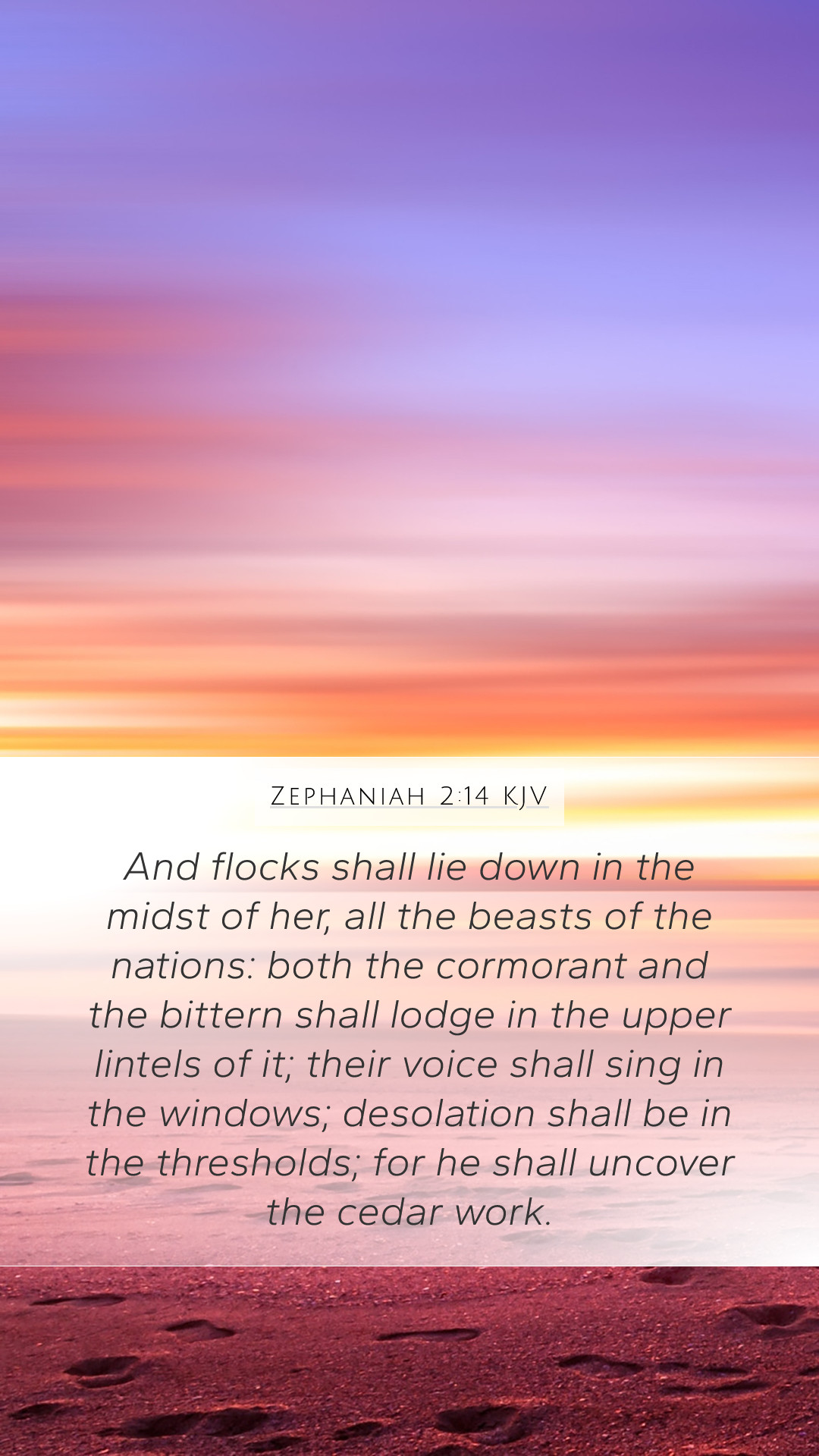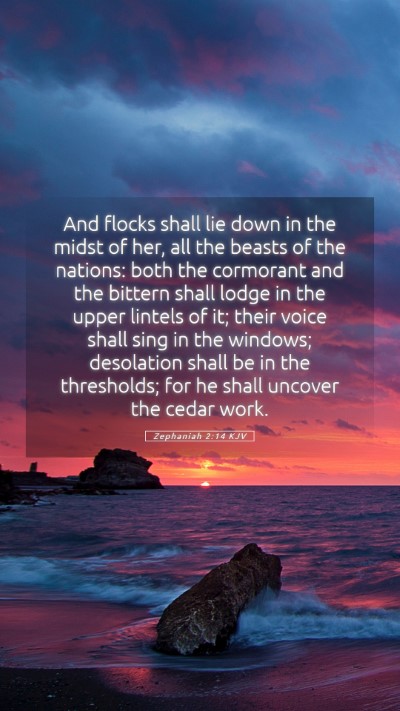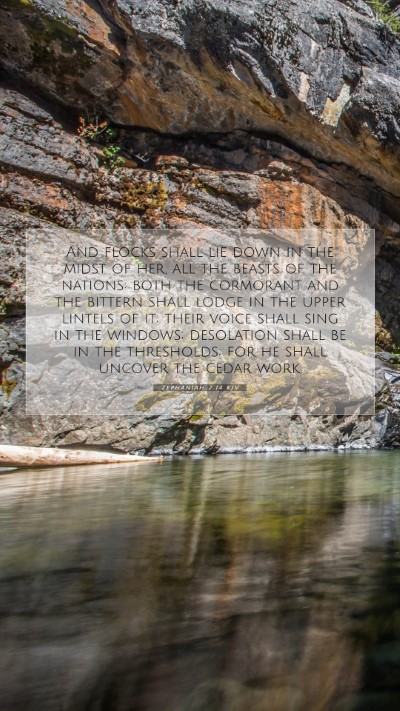Old Testament
Genesis Exodus Leviticus Numbers Deuteronomy Joshua Judges Ruth 1 Samuel 2 Samuel 1 Kings 2 Kings 1 Chronicles 2 Chronicles Ezra Nehemiah Esther Job Psalms Proverbs Ecclesiastes Song of Solomon Isaiah Jeremiah Lamentations Ezekiel Daniel Hosea Joel Amos Obadiah Jonah Micah Nahum Habakkuk Zephaniah Haggai Zechariah MalachiZephaniah 2:14 Meaning
What is the meaning of Zephaniah 2:14?
And flocks shall lie down in the midst of her, all the beasts of the nations: both the cormorant and the bittern shall lodge in the upper lintels of it; their voice shall sing in the windows; desolation shall be in the thresholds; for he shall uncover the cedar work.
Zephaniah 2:14 Bible Verse Meaning
Understanding Zephaniah 2:14: A Comprehensive Commentary
Zephaniah 2:14 states, "And flocks shall lie down in her midst, every beast of the nations. Both the pelican and the bittern shall lodge in the capitals of her, their voice shall sing in the windows; desolation shall be at the threshold, for He will lay bare the cedar work." This verse evokes images of desolation intermingled with natural life, showcasing God's judgment against pride and sinfulness.
Bible Verse Meanings and Interpretations
This verse serves as a stark reminder of the outcomes of sin and rebellion against God, particularly concerning the fallen city of Nineveh (or the prophetic Jerusalem context). Here are insights based on various commentaries:
-
Matthew Henry's Commentary:
Matthew Henry emphasizes that the desolation mentioned is a punishment for those who have acted corruptly. He highlights that animals take over desolate places, symbolizing the emptiness that sin brings. The mention of "pelicans and bitterns" suggests a place once filled with human activity is now home to creatures, signifying how sin leads to destruction and alienation from God.
-
Albert Barnes' Commentary:
Albert Barnes points out the vivid imagery used to depict the desolation of the city. The "flocks" and "beasts" symbolize a reversal of fortunes, where what was once a thriving city becomes a mere habitat for wild animals. The absence of humans reinforces the theme of divine judgment and serves as a warning about the consequences of pride.
-
Adam Clarke's Commentary:
Adam Clarke provides historical context, indicating the prophecy refers to the downfall of Nineveh, emphasizing that God's judgment is inevitable. He notes that such scenes illustrate not just physical desolation but also spiritual emptiness. The "cedar work" mentioned signifies the beauty and splendor now reduced to waste, reflecting the brokenness that sin can bring to a once-glorious life or city.
Scripture Analysis: Themes and Significance
Zephaniah 2:14 is not just a reflection on Nineveh’s fate; it embodies broader themes within scripture regarding judgment, restoration, and God's sovereignty. Here are some of the themes explored through biblical exegesis of the verse:
- Judgment Against Pride:
This verse reminds readers of the humbling effects of divine judgment. Where there was once pride and ambition, desolation will prevail. This teaches us about the importance of humility before God.
- Desolation and Return to Nature:
The return of wildlife to the city signifies the absence of human corruption. It serves as a metaphor for a purification process that God may enact after bringing judgment to His people.
- Hope Amidst Despair:
Even in these dire prophecies, a thread of hope can emerge. God’s plans are not solely punitive but also restorative, hinting that after judgment may come renewal.
Related Bible Cross References
- Isaiah 34:11: "But the pelican and the porcupine shall possess it, and the owl and the raven shall dwell in it." (A similar imagery of desolation)
- Ezekiel 26:5: "She shall be a place for the spreading of nets in the midst of the sea." (Reflecting judgment upon nation)
- Revelation 18:2: "And he cried out with a mighty voice, saying, 'Fallen, fallen is Babylon the great!'" (Prophetic judgment themes)
Application of Zephaniah 2:14 for Daily Life
Understanding Zephaniah 2:14 provides numerous applications for today’s believers. It encourages self-examination regarding pride and dependence on worldly values. Here are some practical takeaways:
- Humility: Recognizing our position before God can lead to a life centered on His will rather than our pride.
- Awareness of Consequences: This verse serves as a warning about the real consequences of sin and the importance of maintaining a righteous life.
- Hope in Restoration: No matter the extent of destruction in our lives, God’s eventual restoration is always possible, encouraging believers to seek redemption actively.
Conclusion
In summary, Zephaniah 2:14 captures the essence of God's judgment through vivid imagery, revealing profound insights into the realities of spiritual desolation and the hope for renewal. By understanding this verse, believers can deepen their biblical study insights, enhancing their journey toward comprehension of scripture meanings.


